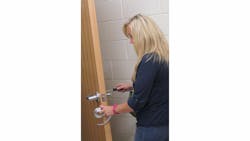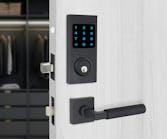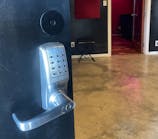As chief locksmith for the Atlanta Public Schools, New Jersey native Kelly Kyzer’s priority is key control. When she took over five years ago, key control was a major issue. She instituted a new masterkey system, created key schedules and switched to a patented keying system. She approves the keying schedule and all hardware before it goes on the doors.
The Atlanta Public Schools exclusively use Best 9K Series locks with the intruder function on all replacement classroom locks. They specify loss motion, which is a more durable, freely moving lever that stands up to kids’ use and abuse, for classroom doors and entry function for school offices. And Stanley has just made its indicator function standard, so future installations will include the indicator that assures teachers that the door is locked from the outside.
“We are making inside cores able to be locked with any teacher’s key. In an emergency, any teacher inside any classroom can lockdown the classroom,” she explains.
The Best cores are installed as schools are renovated. Kelly and her fellow locksmith install all the locks themselves and then train the staff at each individual school to maintain their own keys. “Any school that’s renovated gets patented key systems. Using the Best 9K cores exclusively makes maintenance much easier.”
She also created hardware specs for new schools and renovations. Kelly works closely with Austin Condon, end user consultant, STANLEY Security. Best cores are purchased from distributor partner DH Pace. Condon says he can specify keyways and hardware but Kelly generally already knows what she needs and lets him know. Working closely together, he visits the schools with Kelly and may make recommendations and even furnish products for them to try out on a particularly problematic opening, for instance Stanley’s new door closer that retrofits other brands.
One project Kelly is particularly proud of is the digital key box system, which was tested at one school and has since been expanded to six boxes at four schools, with plans to adopt it systemwide, adding to each school that gets renovated.
“When changing the masterkey system, our most important consideration was ‘How can we best keep control of the keys? Getting keys back from employees who are gone was a really difficult situation.”
Keyboxes are mounted inside the front entrance. Both an employee ID badge and a PIN are required to open the lid of the box. Employees are tracked by their PIN and only have access to certain keyrings, indicated by green lights when they open the box. (All lights are green in our photo because Kelly is the administrator and has access to all).
There is an audit trail and keys are not allowed to be taken off the premises. An alert is activated if the keys aren’t stored properly at the end of the day, triggering email alerts to the keyholder, principal, security, etc.
Specific keyrings (tamperproof so individual keys cannot be removed) are stored in the lockbox for specific personnel. The principal needs a different set of masterkeys than the custodian, for example.
“We’ve created a position in all of the boxes for emergencies. The boxes can be remotely opened via cell phone and the emergency key ring can be given to police and fire personnel in an emergency.” Fortunately, this hasn’t been tested yet.
The Changing Face of Today's Locksmith
Kelly starting working in the locksmith industry as a high school senior. “When I was 17 years old, I had a job as a waitress. A classmate’s family owned a locksmith shop and they used to come eat at the restaurant a lot. They asked me if I would like to work for them,” she explains.
She started out helping with the bookkeeping and clerical stuff, then after just a few weeks, they taught her how to cut keys and she did a lot of key cutting. Then they taught her how to install locks. “Within probably three or four months, I was a technician out on the road by myself.”
Kelly started with this company as a high school senior and worked there for 10 years, then worked as a hospital locksmith for three years. When she was ready for a change of scenery five years ago, she moved from New Jersey to Atlanta and found her current position as locksmith for the Atlanta Public Schools. Has worked there 5 years
APS is a year-round position, typically regular hours. The busiest time is the summer. During the school year, locksmiths mainly concentrate on repairs and replacement of hardware due to wear and vandalism. Summer is the time for school renovations and bigger jobs.
Both Atlanta Public Schools locksmiths are female. Locksmith 2, Vanitta Ross, started out as a general maintenance worker assigned to assist Kelly. She had mechanical aptitude and quickly learned about locksmithing on the job, then officially applied and got the locksmithing job when APS posted that position. Vanitta had never considered locksmithing as a career.
A typical day starts out with reviewing work orders and repairing door hardware that has broken or failed. Vandalism is not unusual. Then Kelly’s day typically includes lots of meetings with school officials. She is involved in the planning of new facilities and major renovations and is working to standardize hardware, using the same Best cores on every new job.
The two women have visited all 88 schools, using workvans set up similar to commercial locksmith vans so they can do key cutting in the field. The back of the van includes plenty of key blanks, hand stamping equipment and a workhorse Best key machine, among other items. However, it is not as packed as your typical retail lockshop van since only key machine is needed and no automotive equipment is needed.
Institutional locksmithing also provides regular hours and a set salary. Emergency calls are few and Kelly is glad not to be taking lockout calls at 2 a.m., noting that she did that in New Jersey, waking her small children and taking them along with her, dozing in their car seats while she did whatever she needed to provide for her family. She also takes pride in helping keep students safe.
For our interview and photo shoot, we met at the brand new, state-of-the-art Maynard Jackson High School. Front entries are equipped with an Aiphone video system that allows visitors to be buzzed into the school office without giving them access to any other portion of the school Employees use a badge system for entry, and extensive video surveillance equipment has been installed campuswide. The school’s security department, rather than locksmithing, handles electronic access control, video surveillance and maintains the badge access system.
Emily Pike | Managing Editor
Emily Pike is managing editor of Locksmith Ledger International.






